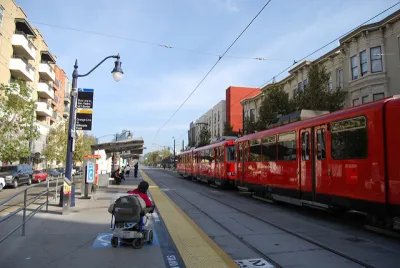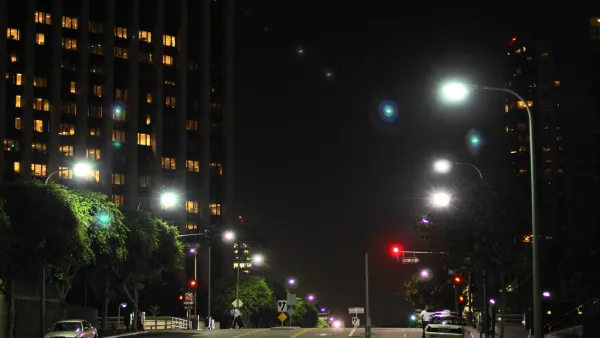A public-private partnership between the city of San Diego and GE Current to develop a smart streetlights program started in 2017 has not lived up to expectations three years and $300 million dollars later.

In 2017, the city of San Diego began to plan for a smart streetlights program that would provide democratized, anonymous data on real-time movement of vehicles, pedestrians, and cyclists to planners and developers. Initially funded by a loan from General Electric, the city teamed up with the private Boston-based company GE Current to launch the program. "The company was promising to fundamentally transform the way the public interacts with its government and its neighbors with data," imparts Jesse Marx.
More than three years since the formation of the partnership issues with unreliable data and difficulties with the installation of the smart streetlights, there is concern that the program is not living up to its original promotional promises including using the sensors to help drivers find open parking spots across the city. "The city’s Sustainability Department has been looking at the data to see how stay-at-home orders are changing pedestrian activity, but officials said they were unaware of any public-facing apps that had been developed yet," writes Marx.
Despite weekly requests for access to data, researchers and developers are unable to create the kinds of apps promised to improve quality of life for San Diego residents because of faulty, incorrect, or unavailable data. According to Marx, only about a dozen of the 3,000 streetlights are producing information.
Technologist and the director of the San Diego Regional Data Library says that San Diego is not alone in its difficulties of implementing new big data systems, citing an underestimation of the effort involved in these projects. In addition, while San Diego owns the raw data collected by sensors, GE Current owns all of the analyzed data as a result of the original contract. City officials will present details to the City Council later in 2020. Moving forward, the city aims to bring between five and ten sensors into the network on a weekly basis. With a budget deficit of about $300 million, Mayor Kevin Faulconer hopes to maintain the $1.3 million in annual funding for the project.
FULL STORY: Smart Streetlights Aren’t Delivering the Data Boosters Promised

Analysis: Cybertruck Fatality Rate Far Exceeds That of Ford Pinto
The Tesla Cybertruck was recalled seven times last year.

National Parks Layoffs Will Cause Communities to Lose Billions
Thousands of essential park workers were laid off this week, just before the busy spring break season.

Retro-silient?: America’s First “Eco-burb,” The Woodlands Turns 50
A master-planned community north of Houston offers lessons on green infrastructure and resilient design, but falls short of its founder’s lofty affordability and walkability goals.

Test News Post 1
This is a summary

Analysis: Cybertruck Fatality Rate Far Exceeds That of Ford Pinto
The Tesla Cybertruck was recalled seven times last year.

Test News Headline 46
Test for the image on the front page.
Urban Design for Planners 1: Software Tools
This six-course series explores essential urban design concepts using open source software and equips planners with the tools they need to participate fully in the urban design process.
Planning for Universal Design
Learn the tools for implementing Universal Design in planning regulations.
EMC Planning Group, Inc.
Planetizen
Planetizen
Mpact (formerly Rail~Volution)
Great Falls Development Authority, Inc.
HUDs Office of Policy Development and Research
NYU Wagner Graduate School of Public Service




























